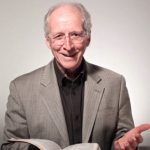This post was originally published in Tabletalk magazine.
The Precious Gift of Baby Talk by John Piper
 Human language is precious. It sets us off from the animals. It makes our most sophisticated scientific discoveries and our deepest emotions sharable. Above all, God chose to reveal Himself to us through human language in the Bible. In the fullness of time, He spoke to us by His Son (Heb. 1:1–2), and that Son spoke human language. In like manner, He sent His Spirit to lead His apostles into all truth so that they could tell the story of the Son in human language. Without this story in human language, we would not know the Son. Therefore, human language is immeasurably precious.
Human language is precious. It sets us off from the animals. It makes our most sophisticated scientific discoveries and our deepest emotions sharable. Above all, God chose to reveal Himself to us through human language in the Bible. In the fullness of time, He spoke to us by His Son (Heb. 1:1–2), and that Son spoke human language. In like manner, He sent His Spirit to lead His apostles into all truth so that they could tell the story of the Son in human language. Without this story in human language, we would not know the Son. Therefore, human language is immeasurably precious.
But it is also imperfect for capturing the fullness of God. In 1 Corinthians 13, there are four comparisons between this present time and the age to come after Christ returns.
Love never ends. As for prophecies, they will pass away; as for tongues, they will cease; as for knowledge, it will pass away. For we know in part and we prophesy in part, but when the perfect comes, the partial will pass away. When I was a child, I spoke like a child, I thought like a child, I reasoned like a child. When I became a man, I gave up childish ways. For now we see in a mirror dimly, but then face to face. Now I know in part; then I shall know fully, even as I have been fully known. So now faith, hope, and love abide, these three; but the greatest of these is love (vv. 8–13). Note the comparisons with this age (now) and the age to come (then):
Now: We know in part.
Then: When the perfect comes, the partial will pass away (vv. 9–10).
Now: I spoke and thought and reasoned like a child.
Then: When I became a man, I gave up childish ways (v. 11).
Now: We see in a mirror dimly.
Then: We will see face to face (v. 12).
Now: I know in part.
Then: I will know fully, even as I am fully known (v. 12).
In this context, we can see what Paul means when he writes, “When I was a child, I spoke like a child, I thought like a child, I reasoned like a child.” He is saying that in this age, our human language and thought and reasoning are like baby talk compared to how we will speak, think, and reason in the age to come.
When Paul was caught up into heaven and given glimpses of heavenly realities, he said that he “heard things that cannot be told, which man may not utter” (2 Cor. 12:4). Our language is insufficient to carry the greatness of all that God is.
But what a blunder it would be to infer from this that we may despise language or treat it with contempt or carelessness. What a blunder, if we began to belittle true statements about God as cheap or unhelpful or false. What folly it would be if we scorned propositions, clauses, phrases, and words, as though they were not inexpressibly precious and essential to life.
The main reason this would be folly is that God chose to send His Son into our nursery and speak baby talk with us. Jesus Christ became a child with us. There was a time when Jesus Himself would have said, “When I was a child, I spoke like a child and thought like a child and reasoned like a child.” That is what the incarnation means. He accommodated Himself to our baby talk. He stammered with us in the nursery of human life in this age.
Jesus spoke baby talk. The Sermon on the Mount is our baby talk. His High Priestly Prayer in John 17 is baby talk. “My God, My God, why have you forsaken me?” (Mark 15:34) is baby talk—infinitely precious, true, glorious baby talk.
More than that, God inspired an entire Bible of baby talk. True baby talk. Baby talk with absolute authority and power. Baby talk that is sweeter than honey and more to be desired than gold. John Calvin said that “God, in so speaking, lisps with us as nurses are wont to do with little children” (Institutes of the Christian Religion, 1.13.1). How precious is the baby talk of God. It is not like grass that withers or flowers that fade; it abides forever (Isa. 40:8).
There will be another language and thought and reasoning in the age to come. And we will see things that could not have been expressed in our present baby talk. But when God sent His Son into our human nursery, talking baby talk and dying for the toddlers, He shut the mouths of those who ridicule the possibilities of truth and beauty in the mouth of babes.
And when God inspired a book with baby talk as the infallible interpretation of Himself, what shall we say of the children who make light of the gift of human language as the medium of knowing God? Woe to those who despise, belittle, exploit, or manipulate this gift to the children of man. It is not a toy in the nursery. It is the breath of life. “The words that I have spoken to you are spirit and life” (John 6:63).

